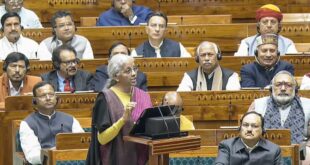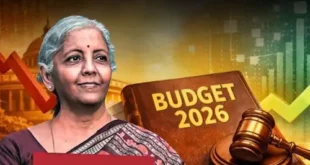 Dr. Seema Javed
Dr. Seema Javed
The UN climate conference- COP29 began in Baku, Azerbaijan, with a heated debate between developing and developed nations over the agenda, delaying the formal start of the conference on Monday. The proceedings were then suspended so delegates could negotiate on the agenda.
Developing countries, including China and India, sparred with rich nations over including “unilateral trade measures”, such as the European Union’s carbon border tax -CBAM, in the agenda of the UN climate talks.

What is CBAM : A Carbon Border Adjustment Mechanism (CBAM) is a policy that charges a carbon price on certain types of imports based on the amount of carbon emissions associated with their production.
On 1 October 2023, the CBAM entered into application in its transitional phase, with the first reporting period for importers ending 31 January 2024, which will end at the end of 2025. CBAM will initially apply to imports of certain goods and selected precursors whose production is carbon intensive and at most significant risk of carbon leakage: cement, iron and steel, aluminium, fertilisers, electricity and hydrogen.
Confusing Policy Landscape: The introduction of the EU CBAM has led to the announcement of more climate and international trade measures worldwide as countries try to limit their exposure to it. Thus far, this has resulted in an uncoordinated and confusing policy landscape.
To ensure that climate and trade policies work to reduce global emissions, they should be aligned with UNFCCC principles and should provide exemptions to avoid placing additional burdens on developing countries
Emissions Trading System: According to the WTO and other international organisations, by next year a quarter of global emissions will pay some form of carbon price, such as under an emissions trading system (ETS), via taxes or tariffs. An ETS has been adopted in multiple countries to enable green transition, including the EU. However putting a price on carbon domestically can drive economic activity away to other areas where a lower price is paid on carbon emissions, if any, opening up governments to accusations that green transition is costing jobs and raising prices without impacting emissions meaningfully.
Difficulties faced by developing nations: Anger at unilateral trade measures amongst Global South nations persists, in particular with the EU’s CBAM, on first day at COP29 negotiations because-
● Stopping carbon leakage imposes costs and the biggest burden will be on small and developing countries, nations with the least historical responsibility for climate change. Since historically rich developed nations were responsible for emission of fossil fuels which caused climate change.
● A proliferation of different border adjustment rules would mean industries face different standards and verification regimes. It would be a costly ‘patchwork’ of rules that would penalise developing countries disproportionately.
● Without multilateral negotiation and coordination, this high-cost ‘patchwork’ scenario is currently the default and likeliest outcome.
● Developing countries, concerned at the costs and potential exclusion from crucial markets, perceive efforts to combat carbon leakage as a misuse of climate arguments for protectionist policies that intentionally discriminate against foreign competitors, in violation of UN climate treaties and trade obligations.
Modelling suggests that the EU CBAM could cost developing countries USD 10.2 billion, with some countries, like India and Russia, most exposed.
Faten Aggad, Executive Director, African Future Policies Hub
On trade issues at COP29 said that- “COP29 should aim to be the turning point to enabling a just transition agenda for all countries. Unilateral actions slow progress towards fulfilling the Paris agreement. What is required is a renewed spirit of cooperation on international trade that fosters decarbonisation without putting an unfair burden on developing countries.”
This year’s conference is crucial as countries need to agree on a new climate finance goal to aid developing nations in adapting to and combating climate change.
The conference opened with Azerbaijan, the host of this year’s UN climate conference, calling on all countries to urgently resolve outstanding issues to agree on a new climate finance goal.
 Jubilee Post News & Views
Jubilee Post News & Views





